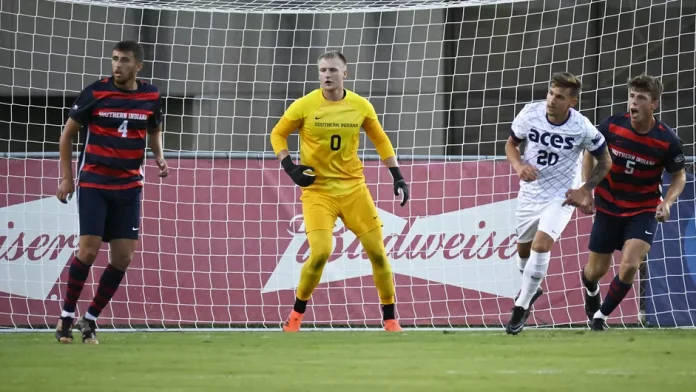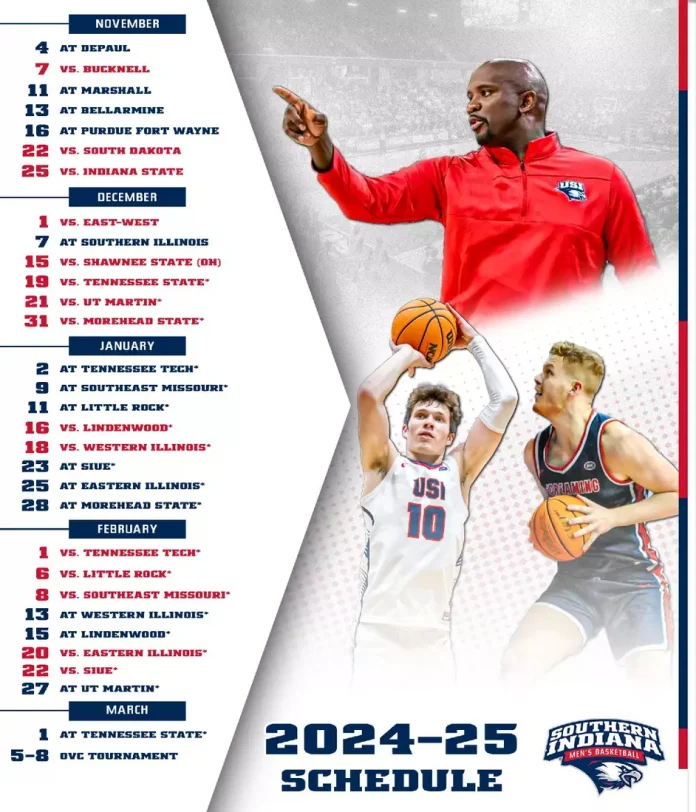
Aces men’s soccer remains unbeaten in shutout win over Eastern Illinois
USI finishes season-opening road swing Sunday Eagles come home September 14
EVANSVILLE, Ind. – University of Southern Indiana Men’s Soccer concludes its five-game season-opening road swing with a visit to Mercer University in Macon, Georgia. The match is set for a special 10 a.m. (CDT) kick off and will air on ESPN+.
Following the USI-Mercer showdown, the Screaming Eagles will appear at Strassweg Field for the first time in 2024 when they host old GLVC-rival Bellarmine University September 14. Kickoff on September 14 is slated for 7 p.m. and will the annual USI Gold Game to promote awareness of childhood cancers.
The USI-Bellarmine contest is the start of a five-match homestand for the Eagles that includes the start of 2024 Ohio Valley Conference slate. The homestand, which is USI’s longest of the season, also includes meetings with Purdue University Ft. Wayne (September 17); Rose-Hulman Institute of Technology (September 25), Eastern Illinois University (September 28) and Lindenwood University (October 3).
USI fans can attend all Men’s Soccer 2024 home matches for free, courtesy of a sponsorship from ProRehab. Game coverage for 2024, including links to live stats and/or video streams, can be found on USIScreamingEagles.com.
USI Men’s Soccer Week 3 Notes:
Eagles come up short in Mayor’s Cup. The Screaming Eagles came up short in the cross-town matchup with the University of Evansville, 3-1, in the Mayor’s Cup. Freshman forward David Davila had the lone USI goals, giving the Eagles a brief 1-0 lead in the opening half.
Davila’s goal. Freshman forward David Davila posted his first collegiate goal in the match at Evansville.
USI falls in heartbreaker at Green Bay. The Eagles lost a heartbreaker Thursday, falling in the final four seconds, 3-2, to the University of Wisconsin Green Bay. USI freshman midfielder Ahiro Nakamae provided all the offense for the Eagles with a pair of first half goals.
Nakamae had three goals in three matches: Freshman midfielder Ahiro Nakamae is the first USI freshman to have three goals in his first three matches since Eric Ramirez had three goals in three matches in 2016. Ramirez would go on to score at least a goal in six of his first eight matches and would lead USI in scoring with 21 points on 10 goals and one assist as a freshman in 2016.
Mercer’s start to 2024: Mercer University is 1-1-2 in 2024. The Bears, who tied the University of North Florida Sunday, are scheduled to host the University of Memphis Thursday before USI arrives on Sunday.
USI vs. Mercer: USI lost the first ever meeting with Mercer last year at USI, 1-0.
Bellarmine in 2024: Bellarmine is off to a 1-2-0 start to the 2024 campaign. The Knights lost to the University of Louisville Monday and are slated to host the University of North Carolina Ashville September 7 and Belmont University September 10 before coming to USI.
USI vs. Bellarmine: USI has a 25-16-2 all-time series lead over Bellarmine, dating back to the beginning of the Great Lakes Valley Conference. The Eagles has the advantage in the last 10 matches, 5-3-2, but the Knights have won the last two (2-0 in 2022; 5-1 in 2019).
THUNDERBOLTS SIGN FORWARD KEVIN HU
USI Men’s Basketball reveals 2024-25 schedule
EVANSVILLE, Ind. – University of Southern Indiana Men’s Basketball revealed its 2024-25 schedule, beginning with a visit to DePaul University November 4. The 2024-25 home opener is slated for November 7 when USI hosts Bucknell University for the first of 15 contests at Screaming Eagles Arena this year.
Following the home opener versus Bucknell, the 2024-25 home non-conference schedule includes South Dakota State University (November 22), Indiana State University (November 25), East/West University (December 1), and Shawnee State University (December 15).
The home portion of the Ohio Valley Conference schedule will feature Tennessee State University (December 19), the University of Tennessee at Martin (December 21), Morehead State University (December 31), Lindenwood University (January 16), Western Illinois University (January 18), Tennessee Tech University (February 1) the University of Arkansas Little Rock (February 6), Southeast Missouri State University (February 8), Eastern Illinois University (February 20), and Southern Illinois University Edwardsville (February 20).
The Screaming Eagles have a challenging road slate following the season-opener at DePaul. USI follows up the trip with a visit to Marshall University (November 11) to begin three-straight on the road, continuing to Bellarmine University (November 13) and Purdue University Fort Wayne (November 16). The final non-conference game of 2024-25 is a trip to Southern Illinois University (December 7).
In OVC play, this year’s conference road slate includes stopovers at Tennessee Tech (January 2), SEMO (January 9), Little Rock (January 11), SIUE (January 23), EIU (January 25), Morehead State (January 28), WIU (February 13); Lindenwood (February 15), UT Martin (February 27), and Tennessee State (March 1).
In the history of the USI Men’s Basketball program, the Eagles are 112-123 all-time versus the 2024-25 opponents. USI is 99-69 against former GLVC-rivals Bellarmine University (53-46) and SIUE (46-23). The Eagles are playing Bellarmine for the first time since the Knights moved to Division I in 2020.
The Constitutionality of a Wealth Tax: A Legal Analysis
The Constitutionality of a Wealth Tax: A Legal Analysis
by Joe Wallace
SEPTEMBER 5, 2024
The idea of a wealth tax, particularly on the ultra-wealthy, has garnered significant attention in recent years as a potential means to reduce inequality and generate revenue. However, the constitutionality of such a tax raises complex legal questions rooted in the interpretation of the U.S. Constitution, especially regarding direct taxes, apportionment, and the meaning of “income.”
Constitutional Framework for Taxation
The U.S. Constitution grants Congress broad taxing powers under Article I, Section 8, which allows Congress to “lay and collect Taxes, Duties, Imposts and Excises.” However, it also imposes specific limitations on how taxes can be levied. Article I, Section 9, Clause 4 states that “No Capitation, or other direct, Tax shall be laid, unless in Proportion to the Census or Enumeration herein before directed to be taken.” This provision requires that direct taxes be apportioned among the states based on population, a significant restriction that has influenced tax policy throughout U.S. history.
The 16th Amendment, ratified in 1913, grants Congress the power to tax incomes “from whatever source derived, without apportionment among the several States.” This amendment was pivotal, as it allowed for the federal income tax without the need for apportionment, previously required for direct taxes. However, the scope of the 16th Amendment is limited to income and does not explicitly extend to wealth.
Is a Wealth Tax a Direct Tax?
The primary constitutional question surrounding a wealth tax is whether it qualifies as a “direct tax.” The Constitution does not clearly define “direct tax,” but the Supreme Court has addressed this issue in several cases. In Pollock v. Farmers’ Loan & Trust Co. (1895), the Court ruled that taxes on real estate and personal property (i.e., wealth) are direct taxes that must be apportioned. This decision was later narrowed by the 16th Amendment, but the question remains whether a wealth tax falls outside the amendment’s reach because it is not a tax on income but rather on the ownership of assets.
A wealth tax would likely be considered a direct tax under the reasoning of Pollock since it taxes the net worth of individuals rather than income generated from that wealth. Because a wealth tax is not tied to income, it would require apportionment under the Constitution unless the Supreme Court reinterprets the definition of direct taxes or creates a new exception.
Wealth Tax on Unrecognized Gains: A Constitutional Distinction?
Proposals have emerged to tax unrecognized gains—essentially unrealized capital gains—among the extremely wealthy. This approach targets the appreciation of assets that have not been sold and therefore not taxed as income under current law. While creative, this type of tax still confronts constitutional hurdles.
The Supreme Court’s decision in Eisner v. Macomber (1920) established that income means “the gain derived from capital, from labor, or from both combined,” and it must be “realized” to be taxable under the 16th Amendment. Under this precedent, taxing unrealized gains would likely fall outside the scope of income taxation as defined by the 16th Amendment, reinforcing the view that such a tax would be a direct tax requiring apportionment.
Financial Disruptions Associated with Taxing Unrealized Gains
Beyond constitutional issues, taxing unrealized gains could lead to significant financial disruptions, including capital flight, devaluation of assets, and liquidity crises. Wealthy individuals may move assets abroad or relocate themselves to jurisdictions with more favorable tax regimes, draining domestic capital. Taxing unrecognized gains could also cause a decline in asset values, as forced sales to pay taxes flood the market. Additionally, many individuals may lack the liquid cash needed to pay taxes on unrealized gains, necessitating borrowing against their assets. This scenario could trigger a liquidity crisis, increasing the risk of defaults and market instability, as asset-backed loans become difficult to manage under volatile market conditions.
Conclusion: Constitutional Challenges Remain
The constitutionality of a wealth tax, particularly on unrealized gains, is uncertain and would face significant legal challenges. The tax would likely be classified as a direct tax, necessitating apportionment among the states—a requirement that is practically unfeasible. While the Supreme Court could potentially revisit and reinterpret the definitions and scope of direct taxes, historical precedent suggests that a wealth tax, as currently proposed, would not align with constitutional requirements without a fundamental shift in judicial interpretation.
Ultimately, adopting a wealth tax on unrecognized gains for the ultra-wealthy requires either a constitutional amendment or a bold reimagining of existing tax law by the Supreme Court. As it stands, significant constitutional and economic obstacles would need to be addressed before such a tax could be deemed permissible under current law.
ABOUT THE HAITIAN CENTER OF EVANSVILLE
The Secretary OF HOMELAND SECURITY may designate a country for TPS due to the following temporary conditions in the country:
- Ongoing armed conflict (such as civil war)
- An environmental disaster (such as an earthquake or hurricane), or an epidemic
- Other extraordinary and temporary conditions
During a designated period, individuals who are TPS beneficiaries or who are found preliminarily eligible for TPS upon initial review of their cases (prima facie eligible):
- Are not removable from the United States
- Can obtain an employment authorization document (EAD)
- May be granted travel authorization
Once granted TPS, an individual cannot be detained by DHS based on his or her immigration status in the United States.
TPS is a temporary benefit that does not lead to lawful permanent resident status or any other immigration status. However, registration for TPS does not prevent you from:
- Applying for nonimmigrant status
- Filing for adjustment of status based on an immigrant petition
- Applying for any other immigration benefit or protection for which you may be eligible
PLEASE NOTE: To be granted any other immigration benefit you must still meet all the eligibility requirements for that particular benefit. An application for TPS does not affect an application for asylum or any other immigration benefit and vice versa. Denial of an application for asylum or any other immigration benefit does not affect your ability to register for TPS, although the grounds of denial of that application may also lead to denial of TPS.
Posted without editing, bias or opinion
Aurora’s River City Wiffle Ball Classic
Join us at Historic Bosse Field (23 Don Mattingly Way Evansville, Indiana 47711) on Saturday, October 5 for the 3rd Annual River City Wiffle Ball Classic benefitting Aurora. This year’s Presenting Grand Slam Sponsor is Fifth Third Bank.
Registration is open for teams of five at rivercitywiffleball.org. The team entry fees is $500. There are also opportunities for your team to crowdfund the cost of team entry. The team that raises the most money will win the team spirit award. To learn more about sponsorships, team entry, or crowdfunding contact Crystal Southern at 812-901-1043. The double elimination tournament is limited to 48 teams and signups are on a first come basis. Teams can be comprised of anyone aged 16 and up. Play competitively in the majors league or just for fun in the minors league. Both garner bragging rights and a traveling trophy for the champs.
The event begins at 8:10 a.m. with a welcoming ceremony followed by the first games starting at 8:30 a.m. Games will take place on eight different fields thanks to our generous field sponsors; Fifth Third Bank, Moore Guitars/Evansville Music Academy, RK Gives Back, Ascension St. Vincent, Liberty Federal Credit Union, SealCorp USA, National Vet Help, and Berry/Plumbers & Steamfitters Local 136. Forty-eight teams and 240 players will be vying for the coveted traveling trophies as they help “Strike Out Homelessness” in our community.
Even though you must be at least 16 to play on a team, there will be plenty of exciting activities for the whole family including Celebrity All-Star Game, food trucks, inflatables, temporary tattoos, a Kids Field sponsored by Hafer, and a free Pick-Up Game Field for adults.
The public is invited to attend. Admission is free.











